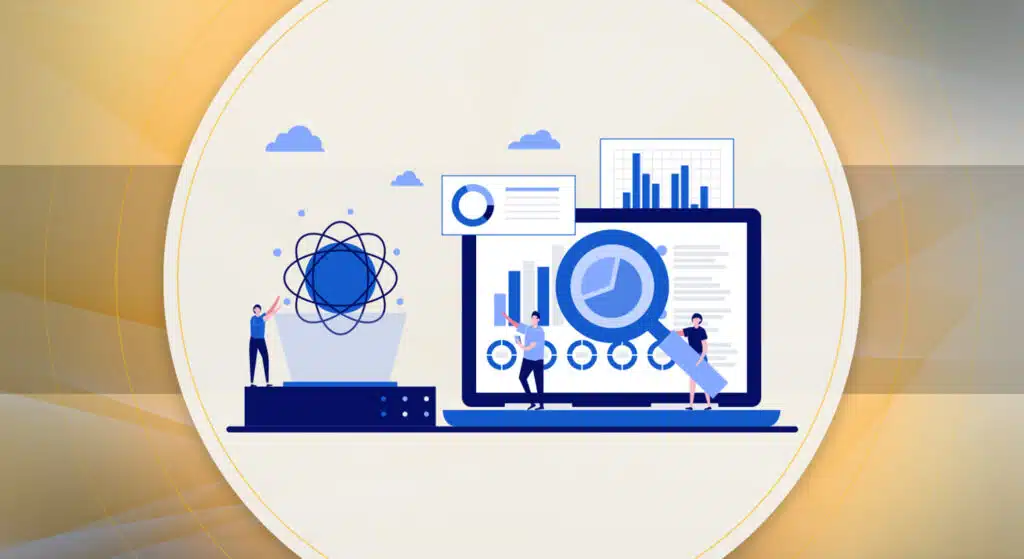Listen to this blog
Key takeaways:
- Massive amounts of data are analysed in order to derive new information and make predictions using data analytics
- Business data analytics is applied to the context of gaining business insight through the use of pre-built business content and tools
- Analytics can help in obtaining and analysing data from the past
- It can also find patterns and trends in the data, as well as the underlying causes
- It helps deliver insights to use by making data-driven business decisions
Business analytics is one of the hottest trends in business today. By leveraging the potential of data, businesses can gain insights into their consumers, operations, and even the competition. Several business analytics tools and techniques are available, but some of the most popular ones include data mining, predictive modelling, and statistical analysis.
Regardless of your business analytics tools and techniques, the goal is always to help you make better decisions to improve your or your organisation’s business.
If you are looking to get started with business analytics or want to learn more about what it can do for your business, check out this blog post. We’ll give you an overview of the future of business analytics.
READ MORE: What is Business Analytics: An overview
Top 15 trends of business analytics
Here are the top trends of business analytics to watch out for in 2022 that will determine the future of business analytics.
- Data governance and quality management will become more prominent
Data governance is an important part of any company’s success—but it’s especially crucial when it comes to business analytics. Businesses need to be able to trust their data before they can use it for decision-making purposes, so they need a system in place that ensures their data is accurate, reliable, and consistent.
This means implementing policies and procedures for managing data quality throughout the entire organisation—from IT departments who manage servers and storage systems all the way through to customer service representatives who are tasked with handling customer requests or complaints.
Business analytics also affects these roles because it puts more emphasis on using evidence-based decision making techniques instead of intuition alone.
- Data management, security, and scalability
Business analytics is the use of data science and statistical methods to turn data into actionable insights. It has an impact on data management, security, and scalability.
- Data Management
Business analytics requires the ability to store large volumes of data. This might be because you are tracking customer activity across multiple channels or because you are looking for patterns in customer behaviour that suggest a new product line. Whatever the reason for storing large amounts of information about your customers and their purchases, it’s important to have options for managing this volume of data in a way that makes it easy to access and use at any time.
- Security
Security is another area where business analytics has an impact on data management. For example, if you are using machine learning algorithms to analyse customer purchasing patterns, you need to ensure that the information they generate isn’t accessible by unauthorised parties who could potentially misuse it. This means implementing strong encryption protocols and keeping up-to-date with any new security standards that emerge as technology evolves over time—such as GDPR compliance requirements in Europe recently passed by Parliament earlier this year!
- Citizen data scientists
It’s simple: business analytics affects citizen data scientists because it helps to make their work more efficient.
In order to understand how, let’s take a closer look at what business analytics actually is. Business analytics is the process of collecting, analysing, and interpreting data to make better decisions about business performance. It’s often used by companies to make sure they are operating as efficiently as possible by tracking metrics like sales volume and customer retention rates over time.
Because it helps companies get an idea of how they are doing compared to their competitors, it also helps them stay ahead of the game—which means that when you are considering using business analytics in your own life as a citizen data scientist, you can use it to make sure you are using your resources wisely too!
- Digital privacy — Need of the hour!
A business analytics program collects data on user behaviour, location, and more. It means that businesses can build up extensive profiles of you without your knowledge—or permission! And since businesses are able to collect so much data about their customers, they are able to create incredibly detailed profiles of individuals’ habits, preferences, hobbies… basically anything that could affect their ability to sell you something. A company might know where you shop for clothes (and what kind), how often you buy new shoes or purses for yourself or others, how much money you make (and spend) on food every month… all because of the information they’ve collected from their business analytics software.
- Augmented analytics to take centre stage
Augmented Analytics refers to the use of artificial intelligence (AI) techniques in order to make sense of data from multiple sources – including structured data from databases, unstructured data from documents and emails, sensor data from IoT devices, video feeds from cameras or drones – so that it can be used for optimised decision making.
The combination of business analytics and augmented analytics provides enterprises with an opportunity to gain real-time insights into their business operations by combining historical data with real-time IoT data streams. These insights help them make faster decisions based on reliable information rather than intuition alone.
- Predictive and prescriptive analytics
Predictive analytics involves using historical data to predict future outcomes. You might use predictive analytics to figure out which customers will stop buying your product in the next two months based on their purchase history. It helps you find specific solutions for problems by using historical data as well as information about potential future events.
In addition to helping businesses make better decisions about their operations and finances, business analytics also helps companies understand their customers better and improve products or services based on consumer needs and wants.
- Automation and artificial intelligence enhancing the consumer experience
If you are running a business, you’ve probably heard of automation and artificial intelligence. You may have even thought about how those concepts could be used in your industry. But have you considered how they could be used together?
In recent years, business analytics has been combined with automation and artificial intelligence to create an enhanced customer experience that can help your organisation stand out from the crowd.
For example, if you sell clothing online, you might use automated systems like chatbots or virtual assistants as part of an analytics-based approach that helps shoppers find what they are looking for quickly and easily. This will not only improve customer satisfaction but also make sure that they don’t leave your website before making a purchase!
- Embedded analytics
Embedded analytics is the process of analysing data and presenting it in a way that is easily digestible for business users. It allows organisations to make better decisions by providing insights that are easy to understand and actionable.
It can help improve decision-making, increase operational efficiency, and drive revenue growth. Additionally, it can help you better understand your customers and make more informed decisions about your product or service offerings.
If you want to get started with embedded analytics, you should keep a few things in mind:
- Choose suitable data sources
- Select the right tools and technologies
- Get the right team to make the most of embedded analytics
- Demand for search-based discovery tools will rise
The demand for search-based discovery tools has been growing rapidly over the years because they provide a quick way for businesses to find relevant information on the internet. This has led to the rise of search-based discovery tools such as Google Analytics and Tableau, which help businesses gain insight into trends and patterns in their data. However, business analytics is not just about using existing tools—it’s also about creating new ones that will help you analyse your data better.
The increasing popularity of social media websites such as Facebook and Twitter has also helped to drive this need for search-based discovery tools because users can now share information about their preferences and interests with each other via these platforms.
- AI and machine learning: Not going anywhere
While AI and ML are not new technologies, they are still in their infancy and have a long way to go before they can truly replace human beings in the workplace. However, they do complement each other quite well. Business analytics helps AI and ML by providing them with a set of data points that they can use to develop algorithms that will allow them to perform specific tasks better than humans can.
For example, if you want an AI algorithm to be able to recognize different voices in an audio clip, you’ll need it to be trained on thousands of different clips from different people talking about different things. This requires a lot of time and effort if done manually by humans. But if this task is given over to business analytics professionals, then all you need is one person with knowledge about voice recognition software who has access to millions or even billions of sound files that have already been labelled as belonging to different speakers or subjects.
- Tools for predictive analytics
One of the most important aspects of predictive analytics is data collection. Data is the fuel that powers predictive analytics; it’s what gives you the ability to predict future events based on past trends. To do this well, you need to have accurate and complete data sets available so that your algorithms can learn from them and accurately predict what will happen next.
Another important aspect of predictive analytics is understanding how your algorithm works and how it makes predictions based on historical data. This means understanding how your algorithms work internally as well as understanding what information they are using when making their predictions.
- Cloud usage will increase because of the increase in SMB demand
The cloud is a big topic, and it’s something that everyone is talking about these days. Whether you are an SMB owner or an enterprise company, the cloud can help you improve your business and make it more efficient.
Cloud technology makes it easier for businesses to expand their operations and grow their customer base. Cloud computing allows companies to manage their data in real-time so they don’t have to worry about storage space or backups—all they need is an internet connection! This means that they can focus on growing their business instead of worrying about technology issues.
By taking advantage of the cloud, businesses can increase their productivity by up to 40%. They can also offer better customer service and provide better products/services at lower prices because they won’t have as much overhead costs (which means there will be more profits left over after expenses).
- Increase in self-service insights generated by BI tools
Business analytics helps them to improve their business processes by ensuring that the right data is gathered, analysed and interpreted. This is done with the help of Business Intelligence (BI) tools. These BI tools are used in many different ways but one of their most common uses is to generate insights about the organisation’s business performance.
However, as a business grows, it becomes more difficult for employees to gather information from various departments and put it all together in one place so that they can start analysing it and reach conclusions about how well their company is doing. This is where self-service BI tools come into play.
These tools allow employees to gather information directly from multiple sources without having to go through anyone else or wait on them for answers.
Self-service BI tools also allow companies to save money because they don’t have to hire someone who specialises in data analytics anymore – all they need now is someone with basic computer skills who knows how these tools work!
- Speech analytics tools will aid in the generation of insights
Speech analytics tools will aid in the generation of insights by providing data on what employees are saying about their organisation and its products/services. The insights generated from the data will help organisations improve their communication with customers, clients and employees.
- Decision-making will be aided with AI-enabled Bl tools
The problem is that most businesses don’t have access to all the data they need to make informed decisions. They might be able to see customer purchase history, but they don’t have access to information regarding customer sentiment or other important factors that could influence their buying decisions.
Business analytics tools can help increase the amount of data available for analysis by collecting data from multiple sources and storing it in one place. However, this information isn’t always accurate or reliable because it comes from different sources with varying degrees of accuracy.
Algorithms can be used to normalise this information so that it’s more consistent across multiple sources and less prone to error or bias. Algorithms can also be used as part of an automated workflow that automatically performs certain actions based on predetermined rules or conditions set by users (e.g., send an email when certain conditions are met).
Final word
Is the future of business analytics as bright as some believe or bleak? We believe it is bright enough to dispel any remaining doubts or melancholy. Because of the incorporation of customisation, AI, and data quality control, the field and scope of business analytics feel more lively and intense than ever before. As organisations continue to open the floodgates of customer data, we may expect a greater emphasis on security and privacy in our debates about trends in business analytics.
If you would like to start a career in business analytics, you can enrol in the online master’s or postgraduate certificate programme in business analytics offered by the prestigious Manipal Academy of Higher Education (MAHE) through Online Manipal.
Become future-ready with our online M.Sc. in Business Analytics program













